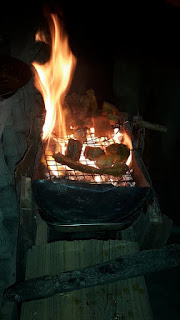I have been in EduCARE long enough to see two dozen interns come in my life and leave it. Most likely forever. No hard feelings there, just a cold fact.
The life of every EduCARE intern flows more or less the same course: confusion, understanding, hard work, leaving party. In between, the glances at the life we all know back home are few. Some search for them harder than other. End of the line, everyone had to abandon such things as a good piece of cheese, maple syrup, or barbecue parties.
Over the months, leaving parties have become less and less appealing to me. I became more distant to the whole exercise. Not that I didn't care anymore for the people ending their stay in India. Quite the opposite actually. But, it is always the same ritual. It usually involves a restaurant. Maybe a cake and a gift. Most definitely a card with kind words written in the secret of someone's laps or behind a kitchen door. Some boredom came over the months.
And then it was time for Whitney to leave.
And I knew she would make sure that every generation of Naddi interns will pass to one another the story of the grandiose feast she was to organise.
And she did.
Whitney renounced many of her small pleasures of life, just like the rest of us. But her passion for grilled meat was never one of them. She kept talking about pork, chicken, lamb and turkey. Grilled, fried, sautéed, or pan-fried.
It started in mid-August, a good month before the party was due. Arnaud, my roommate and civil engineer in the making, came to our flat. He also happened to be a DIY amateur. Whitney immediately saw the potential of the young man for her grand scheme. He was to build a barbeque. A tool capable of supporting on its shoulders a whole party to be remembered by subsequent interns until the end of time. For four good weeks, Whitney harassed Arnaud to have her weapon of mass food creation ready. And the harassing was not your regular harassing. It Whitney pursuing her will. There were only two ways out of this: you run as far as possible and change identity, or you accept.
India being India, Arnaud became resourceful in his Eco-Building functions. He no longer looked for a store to buy wood, or used a specially designed piece of metal to have a container for the coal. No. In the greatest of secret, he scavenged wood from a broken bed lying on our rooftop, an old paint barrel from a waste dealer nearby, reused a few nails, and the grills that were available in our office. With a bucket of the ingenuity that characterises Arnaud, he managed to build us a superb grill with a cover and two side stands. The whole thing looked like a real barbeque. One you would buy on a lazy Saturday afternoon in your neighbourhood hardware shop. With a ghetto style that definitely adds to the project. All of that during his weekend, and without Whitney noticing any of it until a few days before the party.
 |
| Arnaud DIY barbecue! |
Of course, as the D-Day drew closer and closer, we started to tease Whitney about the grill, and how the chalk picture Arnaud drew on the wall was the only BBQ party she will ever get in India. But, we finally reached the point where we couldn’t hide it from her anymore. We had to show it. And it was Revelation.
Her culinary imagination just got unleashed. And nobody could tell where it would lead us. Probably in a world made of grilled meat and veggies. Where paneer will happily co-habitate with ribs and chicken wings. And who knows other marvellous dishes.
The day before the party I came home to a marvellous smell embalming the whole four stories building we call home. And I knew it was on. The demon had been released. When I pushed the kitchen door, I saw my friend in front of the stove, a huge pile of marinated meat on her right and even more already cooking, exhaling those divine fumes.
 |
| Delicious marinated meat getting ready in "The Barbecue" |
6:30. Our guests are already arriving for what is promising to be an epic evening. I started the grill on our small balcony. The wood began to smoke and vanish into the clear sky. It is good to be out after two months of monsoon and the daily curtains of rain. I looked at the embers getting redder and redder. As the evening grow later, the zucchinis and aubergines, the chicken and the pork slowly cooked on the grill. Inside, the fifteen Naddi team members and other EduCARE interns were peeling potatoes, chopping tomatoes and cucumbers. Pineapple and curd mixed and frozen to concoct us an as amazing desert as India can provide. And of course, the finally result was foodgasmic.
 |
| EduCARE interns enjoying the feast at Whitney's farewell party |
Whitney definitely set the bar high for her leaving party. So high, that I can’t see anyone coming close to it any time soon. And so be it. Some records are not meant to be broken. They are to be looked at and admired for the pugnacity and efforts that they require.
Tomorrow one of my oldest friends in EduCARE will be gone. My partner in cooking crimes. But she went away on her own terms: grandiose, flamboyant, and most importantly freaking delicious.
Elliott Messeiller - Switzerland
SWASH Coordinator, Naddi


















